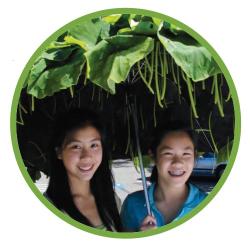Source Institutions
Source Institutions
Add to list Go to activity
Activity link broken? See if it's at the internet archive

This is an activity (located on page 3 of PDF under Nasturtium Leaves Activity) about surface tension. Learners will test different leaves with drops of water and full submersion to compare how water interacts with the leaf surface. Water will stick to some leaves more than others, seeming to almost jump off some. Learners record their observations in a table and produce leaf drawings/rubbings. This activity introduces learners to forces on the nanoscale and relates to linked video, DragonflyTV Nano: Nasturtium Leaves.
- 5 to 10 minutes
- 1 to 2 hours
- $5 - $10 per group of students
- Ages 8 - 14
- Activity, Experiment/Lab Activity, Lesson/Lesson Plan
- English
Quick Guide
Materials List (per group of students)
- leaves from various plants (geranium, nasturtium, lamb’s ear, begonia)
- water
- eye dropper
- magnifying glass
- notebook and pencil
Subjects
-
Engineering and Technology
-
Engineering
- Nanotechnology
-
Engineering
-
Life Sciences
-
Diversity of Life
- Plants
-
Diversity of Life
-
Mathematics
-
Data Analysis and Probability
- Data Analysis
- Data Collection
- Data Representation
-
Measurement
- Size and Scale
-
Data Analysis and Probability
-
Physical Sciences
-
Chemistry
- Chemical Bonding
-
States of Matter
- Liquids
- Structure and Properties of Matter
-
Chemistry
-
The Nature of Science
-
The Scientific Process
- Conducting Investigations
- Gathering Data
- Formulating Explanations
- Communicating Results
-
The Scientific Process
Informal Categories
- Nature and Environment
Audience
To use this activity, learners need to:
- see
- touch
Learning styles supported:
- Involves teamwork and communication skills
- Involves hands-on or lab activities
Other
Components that are part of this resource:
Includes alignment to state and/or national standards:
This resource is part of:
Access Rights:
- Free access
By:
Source Collection
- DragonflyTV
Rights:
- All rights reserved, Twin Cities Public Television, Inc., 2008
Funding Source:
- National Science Foundation, 741749
